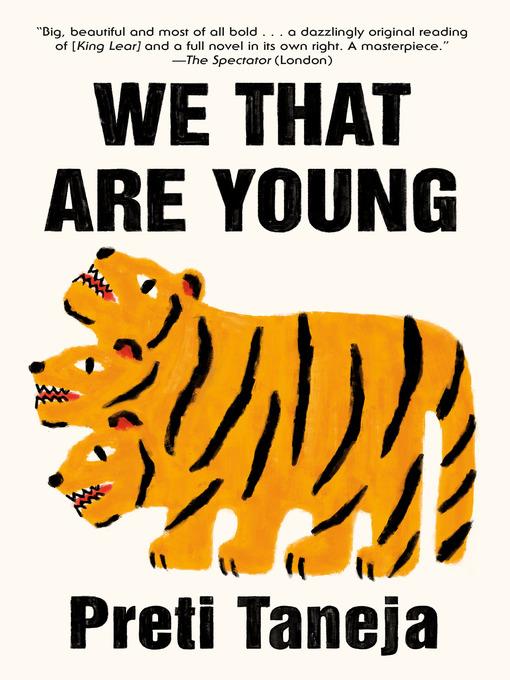
We That Are Young
A novel
کتاب های مرتبط
- اطلاعات
- نقد و بررسی
- دیدگاه کاربران
نقد و بررسی

June 15, 2018
Shakespeare's supreme tragedy, King Lear, is transposed to contemporary India and recast as a family drama of financial power-brokering within a transforming, culturally complex nation."Don't we have 'the youngest population, the fastest growing democracy' in the world?...This Company doesn't need old men, still living in the glory days of the '80s and '90s. It's now, guys. Our time." Issues of gender and generation spearhead the conflict in this mammoth drama of money, succession, and control, British-born Taneja's impressive first work of fiction. Pulsing with vitality, it ranges widely across the subcontinent, delivering the familiar bones of the story mainly from the perspective of the younger generation. Patriarch Devraj Bapuji--an aging tycoon whose business empire, the Company, makes its wealth principally from hotels--and his second-in-command, Ranjit Singh, have sired the five children whose perspectives shape the storytelling. First comes Jivan, Ranjit's illegitimate son, arriving back in India after 15 years in the U.S. to witness the day of Bapuji's sudden announcement that he's quitting his own company and transferring power to his daughters, Gargi and Radha. (Sita, the favorite, has disappeared.) Capable Gargi steps into the CEO role, eventually confronting her father and banning half of the Hundred, his rowdy cohort of favored employees, from the family compound. Radha, unlike Gargi, luxuriates in the trappings of wealth, but there's a dark history behind her sensual indulgences. And then there's Jeet, Jivan's gay half brother, who forsakes his wealth for a pilgrimage that will plunge him to the bottom of the social ladder to witness some of Bapuji's comeback campaign. Sita's section comes last, as the key players assemble for the glamorous opening of a new hotel in Srinagar and Taneja's dreamy synthesis of language, place, food, clashing views and values, seeping Westernization, and post-colonial flux reaches its climax.A long, challenging, but inspired modernization of a classic--engaging, relevant, and very dark.
COPYRIGHT(2018) Kirkus Reviews, ALL RIGHTS RESERVED.

Starred review from August 13, 2018
Taneja’s impressive debut uses King Lear as a template but fearlessly carves a territory of its own. While remaining close to Shakespeare’s plot points, she offers a portrait of modern India both panoramic and complex, through the eyes of six main characters. The story begins in 2012 with Jivan Singh returning to his native New Delhi after 15 years in the United States. The illegitimate son of towering Indian magnate Devraj Bapuji, Jivan has come home as his elderly father prepares to hand off his business empire, but to whom? There are three daughters—Gargi, Radha, and Sita—as well as Jeet, a surrogate son and offspring of Devraj’s right hand, Ranjit. Jeet’s case for succession is weakened because he’s gay (given the conservative nature of the business establishment), a fact he’s loath to admit. Jivan, as a semi-outsider, is the ideal opening guide for the reader. The perspective shifts to Gargi, “custodian of her father’s office.” Business gives Gargi an adrenaline rush like nothing else. From Gargi, focus travels to Radhi (Regan to Gargi’s Goneril), who’s as “feminine” and sensual as her older sister is “masculine.” Sections devoted to Jeet and Sita follow. Short chapters of Devraj speaking directly to the reader are interspersed throughout, and the plot follows his rapid mental and physical decline while Radhi and Gargi battle for control of his empire. Taneja’s intricate, literary prose is heavy in both detail and reflection. This is a work of epic scope and depth that’s bracingly of the current moment.

Starred review from August 1, 2018
Every now and then, a writer grabs you in the first paragraph and doesn't let go. Such is the case with Taneja, whose stunning debut brims with familial jealousy, sexual tension, political turmoil, and shocking violence. Set in India during the anticorruption riots of the current decade, it hews closely to the tragic story line of Shakespeare's King Lear. Three sisters, Gargi, Radha, and Sita, have been raised under the iron rule of their father, Bapu Devraj, a developer with tentacles in every area of Indian business. At 75, Bapu is preparing to divide the company among his two older daughters and their spouses just as two prodigals return to the fold. Jivan, illegitimate son of Bapu's right-hand man, Ranjit Singh, exiled to the States as a youngster, now boasts a Harvard degree and a yen for money. Sita, an environmentalist, educated in London, opposes the expansion of the company's ostentatious luxury hotel line into politically fraught Kashmir. This stance divides the family and sets in motion a series of events that force readers to rethink the motivations and loyalties of every character. VERDICT Taneja writes with a passion and verve that reflects her human rights reporter and filmmaker background. Highly recommended for socially conscious readers. [See Prepub Alert, 3/26/18.]--Sally Bissell, formerly with Lee Cty. Lib. Syst., Fort Myers, FL
Copyright 2018 Library Journal, LLC Used with permission.

August 1, 2018
When the Devraj family patriarch decides to step down as head of the flourishing industry and entertainment conglomerate he founded, chaos follows: youngest daughter Sita disappears, rejecting the man chosen for her to marry, and her older sisters Radha and Garg battle for control of the company. Meanwhile, family bastard Jivan Singh returns to New Delhi with his own plans. A debut echoing King Lear while examining contemporary India and human emotions in extremis; no wonder there's big in-house enthusiasm.
Copyright 2018 Library Journal, LLC Used with permission.

























دیدگاه کاربران